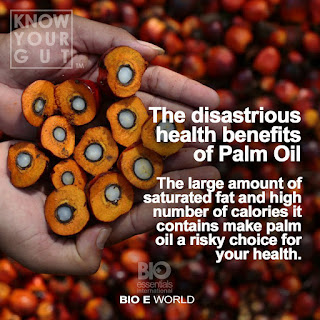The disastrous health effects of Palm Oil
Generally, plant oils are more beneficial for health than animal fats, but palm oil is an exception. Palm oil comes from the fruit of the palm oil tree and is grown on large plantations in tropical places such as Indonesia and Malaysia. At room temperature, palm oil is the consistency of butter or shortening and is often used in place of them in baked goods and processed foods. The large amount of saturated fat and high number of calories it contains make palm oil a risky choice for your health.
High in Fat
Diets high in fats such as palm oil can lead to weight gain, heart problems and other chronic disease. Eating a proper amount of fat is essential to human health, but too much can be detrimental. According to the Institute of Medicine Food and Nutrition Board, adults eating a 2,000-calorie daily diet should consume no more than 44 to 78 grams of fat per day. One tablespoon of palm oil has 120 calories and 13.6 grams of fat. If using palm oil, do so sparingly with regard to the amount of calories and fat it contains.
Saturated Fat
Palm oil is particularly high in saturated fat. The University of Maryland Medical Center states that diets high in saturated fat can lead to an elevated cholesterol level and a build up of plaque in the arteries. Over time, this can lead to heart attack or stroke. Thus, it is recommended by the American Heart Association to eat no more than 16 grams of saturated fat per day for a daily diet of 2,000 calories. One tablespoon of palm oil has 6.7 grams of saturated fat. In just 2.5 tablespoons of palm oil, you would exceed the recommended daily maximum of saturated fat.
Cholesterol
Cholesterol comes from foods that you eat and also from our bodies, which naturally produces it from saturated fat. This means the more saturated fat you consume, the more building blocks your body has available to make cholesterol, leading to elevated levels and increased potential for health complications. According to food expert Marion Nestle, author of the book "What to Eat", palmitic acid is a type of saturated that makes up most of the fat in palm oil. She goes on to say in her book that this fat is "especially adept at raising cholesterol levels" and that "palm oils are decidedly worse than butter" for this reason.
Hypertension
In addition to causing weight gain and elevated cholesterol, consuming palm oil that has been heated may elevate blood pressure. A study published in the December 2011 issue of "Clinics" found that heating vegetable oil produces free radicals. Over time, free radicals can lead to chronic disease. In this study consuming heated palm oil was specifically linked to hypertension. However, when the palm oil was unheated and raw, no detrimental impact on blood pressure was seen. This means palm oil may be safer to consume in a raw, unheated, uncooked state.




Comments
Post a Comment